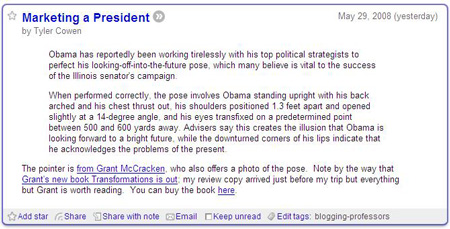One of the interesting features of Twitter is that you can delete a “tweet” you’ve written and it will retroactively disappear from any of your followers’ lists of tweets. This is different from RSS, where, once an RSS reader has collected the post data from a feed, the excerpt (or entire post) in the RSS reader takes on a life of its own, independent of the original blog post. So if you make any revisions to your original post after various readers have been “pinged,” then chances are those changes will not be reflected in the RSS feeds.
Case in point, Tyler Cowen at Marginal Revolution, posted a link to and some comments about a “news report” on how Barack Obama spends hours practicing gazing into the future pose. The only trouble was, this story, which Cowen appears to have taken at face value, was originally from The Onion. I read Tyler’s post on Google Reader, and when I tried to follow the story back to the Marginal Revolution site, I discovered Tyler had deleted the post, presumably because he realized his mistake. Here, below, is the only evidence that the post ever existed, a screen shot of the Marginal Revolution feed in my Google Reader.
This vanishing post brings up some interesting questions for the age of blogging. When is it necessary to delete a post entirely, versus tacking on an addendum? Why not let an erroneous post stay live, but let the follow-up comments sort through any corrections that need to be made, preserving the original post as a kind of historical document (much as Wikipedia archives every version of a Wiki entry as part of the entry’s “history”)?
The vanishing post also highlights the fact that in the digital age, nothing is ever “lost.” As numerous politicians have discovered, even something as seemingly ephemeral as a text message is preserved in some corporation’s database, subject to subpoena. Come to think of it, I’m sure even Twitter has a copy of those tweets I deleted…

Great post, Mark. Obviously these issues are very important to historians just as they are to literature and other textual scholars. Another great example of how the technology has outpaced our ability to develop social conventions for dealing with it.
[…] here I have another gift, another example of the seeming impermanence of new media coupled with the ubiquity of saved or cached data, which allows us to reveal the revisions that the […]